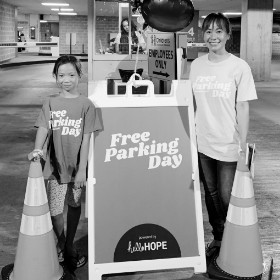9 Questions to Ask (and 3 to Avoid) When Talking to a Family Facing Medical Adversity
Based on our experience, one of the lies we believe when we’re going through difficulty is that we are alone. I think one of the reasons is that it can be hard to know what to say (or not say), how to help someone, or how to be comfortable with silence. I know there are plenty of times I didn’t start conversations with another person simply because I didn’t know what to say. Will I offend them? Will I say something dumb? Will I make things worse?
These awkward moments are barriers to spreading hope, not because they’re awkward, but because they prevent us from reaching out to connect with hurting, stressed, or discouraged people who need to know that they are not alone.
So how do we overcome our fears and step out in conversation? How do we show someone that we genuinely care without being cliché or cheesy? I’m learning that showing someone that you care about them and that you value them is about listening. I’m certainly no expert conversationalist, but I’ve observed and learned that questions are one of the most powerful ways to connect with someone and show that you care. In fact, the most amazing conversationalists I know aren’t especially smooth or well spoken; they just care deeply about people and ask great questions. Here are a few starter questions that might help you break the ice.
Questions that Work for Any Age
Would you mind telling me about your story?
If you are curious about someone’s situation, it’s all about the approach. In most cases, I believe people are happy to tell their story. Personally, Mary Beth and I are always happy to share our medical experience with other people. My advice is this: Be polite, give the person a way out if he or she doesn’t want to talk, and care about the story.
Are there any updates since we last talked?
If you are already familiar with the person, asking for the latest news on how things are going is a great way to show your care and interest in someone’s situation. This may also give you new ways to pray for someone.
What have you enjoyed doing over the last week?
Sometimes the challenges of medical struggles can be exhausting and discouraging. Asking about a positive thing that happened over the week may bring a smile to both of your faces. Additionally, it may not sound good to the person you’re speaking with to continually repeat the details of his or her situation. I find it so helpful (and hopeful) to focus on thankfulness when circumstances are difficult.
What has been the hardest part of the last week?
The last question brings out something positive over the last week, but sometimes asking about the difficulties is a good way to show someone that you care. It’s also helpful to remember that the other person may just need a listening ear or a shoulder to cry on. Sometimes we need to be honest about the hard things going on so we can focus on the goodness and promises of God. Sometimes we just need to take off the mask that everything is okay and acknowledge the pain or frustration of the moment.
How are the other family members doing?
When medical challenges hit, the whole family is impacted. Spouses, children, siblings, parents, and even close friends. Each person processes and handles major life events differently, so it’s great to show your care for the whole family by asking about them.
How about this weather? That game? That show?
Another tip when you’re having a conversation with someone going through a difficult situation is to remember that small talk is okay. Sometimes it’s nice to talk about normal everyday life things like the weather, sports, or anything else. These parts of the conversation can take the pressure off and be a nice way to connect.
Questions to Ask if You’re Talking to Kids
What is your favorite thing to do right now?
Kids can get a sense that you care for them if you are interested in the things that they enjoy. From listening to music to hobbies to games to reading, this question may give you a whole new realm of things to discuss or a new place to share common ground.
What are you looking forward to that is coming up?
Anticipation is tied to hope. Any medical journey carries with it stages you have to go through and milestones to look forward to. Ask the child what he or she is looking forward to, and you can build hope and expectation together.
Have you met any new friends lately?
New places and new experiences can mean opportunities for kids to meet new people. From nurses to friends to silly visitors, you may learn about special people or touching memories that have had an impact.
Questions to Avoid
What’s wrong with [fill-in-the-blank]?
Be careful how you phrase questions. Asking someone what is wrong with them or their child can be a hurtful question to ask. Regardless of what circumstances or difficulties the person faces, the Lord’s offer for abundant life is for them, too, and there’s no need to be critical of appearances. It’s so important to bring genuine care, compassion, and grace into your conversations.
Why don’t you believe [fill-in-the-blank]?
Medical adversity can rock someone’s belief system and faith. I know there were plenty of times in our story when I wrestled with the goodness of God, His presence, and His will. In the end, truth wins out, and I’m thankful for reminders of God’s truth I received along the way. With that said, those reminders came in gracious and loving contexts, not in judgement. If you are speaking with someone having trouble with doubts or disbelief, they probably need a listening ear and a present friend more than words. Let your actions and care communicate the love of God rather than relying on words.
Why didn’t you [fill-in-the-blank]?
Re-visiting past decisions or events to ask why a choice was made can bring shame. This question is all about context in the conversation and your heart toward the person. If your intention is purely to know the person’s story better or even to learn from their journey if you are finding yourself on a similar path, you can phrase the question with “That must have been so difficult. How did you walk through making that decision?” If, however, you feel critical toward a decision, and you’re asking from that perspective, this question can add undue judgement to a person. Aim for questions rooted in compassion, not criticism.
Final Thoughts
The above questions won’t apply in every situation, but they may serve as a helpful starting point the next time you have a chance to reach out to someone experiencing difficulty. Once you are in a conversation, listen well and ask lots of follow-up questions. One amazing conversationalist I know is a master of this. He genuinely cares about each person he meets, and you can tell he’s listening intently by the (many) thoughtful questions he asks once the conversation has started. From “Tell me more about…” to more specific questions, work to be a good listener.
When it comes to listening, one of the best things you can do is to pray that the Holy Spirit will open your eyes to see what He sees, open your ears to hear what He hears, and open your heart to do what He asks. Listening to God’s heart first will guide you to the right questions to ask and the truth that someone needs to hear. Rely on His guiding, and let’s spread hope, one conversation at a time.













